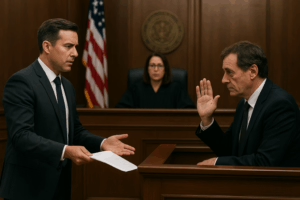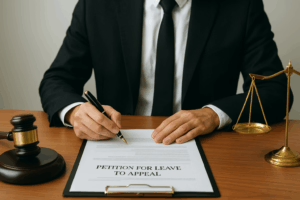Appeal for a Suspended Sentence in Criminal Cases – Can It Be Done?
In Thailand’s criminal justice system, a frequent concern among defendants is whether they can appeal to receive a suspended sentence, particularly when the trial court has already imposed an unsuspended term of imprisonment. This issue is especially relevant for those seeking legal representation from a law firm in Bangkok or a lawyer in Thailand.
The short answer is: Yes, it is possible. But to be successful, it requires solid legal arguments, a persuasive body of evidence, and well-executed legal strategy by a competent lawyer in Bangkok or criminal defense law firm in Thailand. This article outlines how an appeal for a suspended sentence in criminal cases may proceed under Thai law and what strategic actions may significantly improve the chances of a favorable ruling.
Legal Framework for Suspended Sentences in Thailand
What Is a Suspended Sentence?
Under Section 56 of the Thai Criminal Code, a suspended sentence (“rō long ‘āyā”) allows a defendant to avoid immediate imprisonment if the term does not exceed five years and mitigating circumstances exist. Courts may suspend sentences in order to promote rehabilitation, particularly when the defendant poses minimal threat to society.
To learn more about suspended sentencing globally, you may refer to UNODC’s report on sentencing practices.
Can the Appellate Court Grant a Suspension?
Yes. The appellate court has full authority to reassess the appropriateness of sentencing, including the possibility of granting suspension—even if the trial court refused. Appeals may cite legal errors, factual reconsiderations, or simply advocate for leniency, provided the arguments are supported with strong evidence and reasoned legal references.
Six Strategies to Improve Your Appeal for a Suspended Sentence
1. Seek Reconciliation or Compensation with the Victim
For offenses such as defamation, fraud, or embezzlement, negotiating a settlement with the victim—even after conviction—can be critical. If the victim expresses satisfaction or disinterest in further prosecution, courts are more inclined to grant suspension.
2. Submit Financial Compensation via the Court
If direct negotiation fails, the defendant may deposit a sum (e.g., THB 200,000–500,000) to the court unconditionally. This demonstrates remorse and willingness to compensate regardless of the victim’s acceptance, which the Thai appellate court may weigh as a mitigating factor.
3. Establish Context Showing Victim Contribution
In cases involving mutual confrontation or provocation (e.g., physical altercations), defendants may submit factual context showing that they were not the sole aggressor. Courts appreciate respectful and well-documented accounts that aid fair sentencing.
4. Provide Documentation Supporting Rehabilitation
Courts consider whether a defendant is likely to reoffend. Supportive documents include:
-
Proof of family obligations
-
Medical or psychiatric reports
-
Employer recommendations
-
Religious or volunteer commitments
A law firm in Bangkok can help collect and format these documents professionally.
5. Reference Relevant Case Law
Prior judgments in similar cases can strengthen an appeal. Thai courts place high value on precedent, particularly from the Supreme Court or appellate panels. Your lawyer in Thailand can help identify applicable rulings.
6. Request a Social Inquiry Report
If not ordered in trial court, the appellate court may be petitioned to order a probation inquiry. These reports provide independent insights into the defendant’s background, social risks, and rehabilitation potential. Positive findings often influence sentencing decisions.
For a deeper understanding of Thailand’s probation system, see this research article from the Thai Journal of Criminology.
Procedural Essentials: Filing an Appeal
Timing and Filing Requirements
Appeals must be submitted within 30 days from the date of conviction. Defendants may request a single extension. Delay may result in the forfeiture of rights, so hiring a responsive Bangkok law firm is critical.
Petition Structure
Your appeal should include:
-
Overview of conviction
-
Grounds for appeal
-
Legal request for suspended sentencing
-
Supporting evidence and citations
The drafting should be handled by an experienced lawyer in Bangkok to ensure persuasive tone and accuracy.
Court Timeline
Appellate review usually takes 6 to 9 months. During this period, your legal team should remain proactive in monitoring case progress and responding to court requests.
Why Work with a Lead Law Firm in Bangkok?
Choosing the right legal counsel can make or break your appeal. A lead law firm in Bangkok brings advantages in:
-
Legal expertise across all Thai criminal courts
-
Access to support networks (probation, social workers, forensic experts)
-
Case law databases and precedent analysis
For general guidance on selecting a competent law firm, check out this resource from the International Bar Association.
Final Thoughts: Appeal for a Suspended Sentence in Criminal Cases
Appealing for a suspended sentence is not only possible—it can be successful if supported by the right facts, legal reasoning, and documentation. With the guidance of a professional law firm Thailand or a seasoned lawyer Bangkok, defendants can maximize their chances of staying out of prison and rebuilding their lives.
Key takeaway: Early planning, evidence collection, victim communication, and legal precision are essential to a successful appeal. If you’ve been convicted and are unsure about your options, consult with a top law firm Bangkok without delay.





